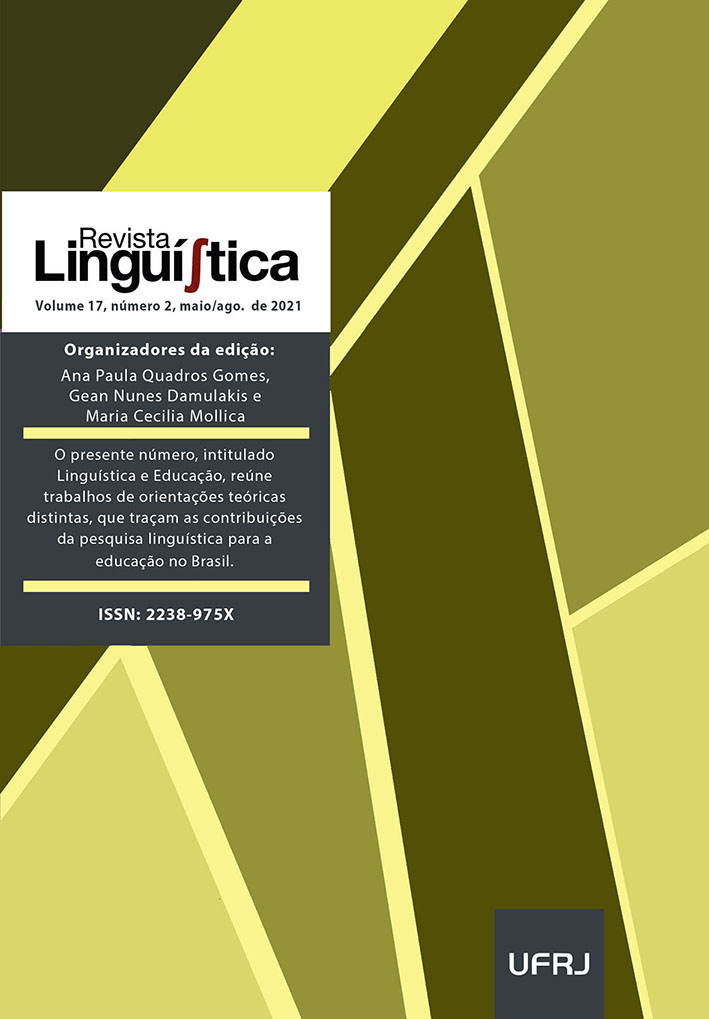O campo das “língua(gens)” na BNCC: uma reflexão sobre o ensino de português e inglês
DOI:
https://doi.org/10.31513/linguistica.2021.v17n2a56578Palavras-chave:
língua(gens), BNCC, português, InglêsResumo
Este trabalho é o resultado de uma proposta de análise desenvolvida no componente curricular Texto e Ensino, um dos eixos disciplinares pertencentes à formação de quem cursa o PROFLETRAS/UFAC, em que parte das discussões tecidas entre professores e pós-graduandos se centrou em uma análise interpretativa das menções sobre o campo “Língua(gens)” na Base Comum Curricular/BNCC. Objetivou-se, para tanto, interpretar como as “Língua(gens)”, no que se refere aos ensinos de língua portuguesa e de língua inglesa na Educação Infantil e nos Ensinos Fundamental e Médio, são abordadas no referido documento, cujas menções fazem relação com o ensino de português e de inglês. A reflexão se alinhou à análise de referências bibliográficas e, por conseguinte, se constituiu em um estudo interpretativo-exploratório, tendo em vista a leitura de textos como Brasil (2018), além de Frasseto (2019), Szundy (2019), Gerhardt; Amorim (2019) e Pacheco; Silva (2019). Para a produção de um olhar crítico sobre a BNCC, além dos trabalhos mencionados, recorreu-se à proposta de educação dialógica de Freire (2011), à discussão sobre interculturalidade crítica desenvolvida por Walsh (2010) e à construção da relação entre as áreas Linguística e Educação, mais precisamente o entrelaçamento entre práticas de leitura e escrita em contextos educacionais, discutidos por Faraco; Tezza (2016), Faraco (2018) e Rocha; Souza (2020). Nas considerações finais, concluiu-se, de maneira geral, que a BNCC propõe um ensino de português e inglês voltado para um conhecimento individual do sujeito, para obtenção, sobretudo, de sucesso profissional, produzindo um efeito meritocrático sobre a formação de estudantes.Downloads
Não há dados estatísticos.
Downloads
Publicado
2021-06-21
Edição
Seção
Artigos
Licença
Autores que publicam na Revista Linguí∫tica concordam com os seguintes termos:
Os autores mantêm os direitos e cedem à revista o direito à primeira publicação, simultaneamente submetido a uma licença Creative Commons que permite o compartilhamento por terceiros com a devida menção ao autor e à primeira publicação pela Revista Linguí∫tica.
Os autores podem entrar em acordos contratuais adicionais e separados para a distribuição não exclusiva da versão publicada da obra (por exemplo, postá-la em um repositório institucional ou publicá-la em um livro), com o reconhecimento de sua publicação inicial na Revista Linguí∫tica.

A Revista Linguí∫tica é uma revista do Programa de Pós-Graduação em Linguística da UFRJ e se utiliza da Licença Creative Commons - Atribuição-NãoComercial 4.0 Internacional (CC-BY-NC)









